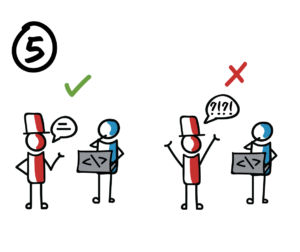Be Agile
The 5 changes managers must do to become leaders in the transformation of their organisation
02 May 2019
by
Sylvain Chery
Today when I meet a manager it is rare that he does not talk to me about changes, transformations (agile, digital, cultural ...), or his difficulties to inspire his colleagues to really engage on this change.
To achieve this, I think that a manager must first realise that change begins with him or herself. By truly embodying this change, we can make sense of the transformation of our organisations, and motivate our employees to get involved and work with us to co-create change. I found that Management 3.0 is a framework and a toolbox that can be very useful to achieve this goal.
The manager: a gardener who cultivates a garden that resemble him
It is not enough to attract and retain employees, we must allow them to express their full potential for creativity so our companies could regain their innovative capacity. My experience, as co-founder and leader of Agile Partner since 2004, leads me to believe that this can be done by creating an enabling environment, rather than "managing" people. Because who wants to be "managed" and to be forced to change?!
"Managing the system, not the people"
To create this nurturing environment, like a gardener creates a garden in his image, every manager must begin by becoming aware of his state of mind, his knowledge and his behavior. By getting to know each other better and getting to know others, he can adapt his practices and behavior to facilitate the development of his collaborators and his organization.
The dissonance leads to exhaustion and failure
When a manager does not embody the change that he is trying to initiate, all of his employees feel a dissonance, an incoherence between what he says and what he does. It is difficult to join the project in these circumstances. The manager is left alone to advance on the transformation. He will tend to try to understand everything, control everything, but it is very complex and too much for only one person, as brilliant as he may be, to achieve it. It may become a bottleneck and exhaust him!
I knew this situation and realised that doing more, putting even more energy into the same actions would not help. I realised that I needed to adopt a different posture. If you too feel that way, here are some changes I suggest you do with yourself, with the help of Management 3.0, to become a successful leader in the transformation of your organisation.
How to embody the change that you want to see happening?

Clarify your vision and priorities
More and more, our employees question the meaning of the work entrusted to them. It is working the same way when they are asked to do a change. Hence the importance of defining a vision, a goal, in a clear way which is easy to communicate. It's your responsibility as leader, to guide the work which can be collective, formulate the objectives (see tools such as OKRs and impact mapping).
It is then your responsibility to make sure all the collaborators (including yourself) are aligned with this vision and act according to it.
Know and activate the motivators
Even if everyone is aligned on the same goal, we must accept that everyone has their own motivators to do so. And what are your motivators? Do you know the motivators of your employees? If you make the effort to discover them (see Management 3.0 Moving Motivators), it will be easier for you to identify common motivations. This contributes to the emergence of the group's culture, which can be more oriented towards competition, order or innovation. You will also be able to better understand how a change can affect everyone's motivations and how to make it a positive lever.


Learn to trust and give confidence
If, like me, you agree that we live in a Volatile, Uncertain, Complex, and Ambiguous ("VUCA") world, then you know that it is impossible for a manager to control everything. You have to accept complexity and learn to let go and trust. Once everyone are aligned on the same goal and the "rules of the game" are clear, the foundations for trust are in place. We can then begin to delegate, and here I am talking about delegating responsibilities and decision making and not just tasks (see Management 3.0 Delegation Poker & Board). The necessary counterpart of this delegation is a great transparency on the decisions and their results. Indeed the manager remains responsible for the decisions taken, even if he has delegated these decisions, he must be able to stay informed and react in case of danger. Transparency also guarantees a form of collective self-regulation.
Give and ask for feedback
This point is certainly one of the most difficult for me, although I have received many explicit requests from my collaborators going in this direction. Of course you have to learn how to give feedback (see, for example, CNV - Nonviolent Communication, Management 3.0 Feedback Wraps and Improvement Dialogues). But you also have to learn to listen and accept criticism. This is only possible if there is genuine mutual respect and a genuine desire to help each other develop, both professionally and personally.


Accept uncertainty and (small) errors
"The right to the mistake" you say! Easier said than done. How not to feel disappointed, even angry, when one of our employees makes a mistake? If they do not take any risks, they can hardly learn, progress or innovate. So how to deal with it?
First, we must accept uncertainty: it is impossible to predict the outcome of certain actions in a certain way. We must learn to experiment quickly, limiting the risks of potentially unwanted outcomes. When the consequences of an error are reduced, one can focus on learning from them (see Management 3.0 Celebration Grids). Being demanding and rigorous does not mean prohibiting and sanctioning mistakes, but rather doing the necessary to prevent the same mistake from happening again, and making any action an opportunity to improve and consolidate learning.
Humility, perhaps the first quality of the manager
Do not expect others to accept a forced change that you are not a part of. As a manager, through your behavior and actions (not just words) you can influence the system and create the right conditions to see the change that your organisation needs, which may not be exactly the same as you imagined 😉 We must have the humility to welcome it! Maybe this is the first work to do on ourselves?
Find me in our next Management 3.0 Foundation Workshop. This workshop is the first step of your transformation! It maximises the practice and sharing of experiences. In 2 days it gives you the keys to be a Leader and to drive your Organisation to become more agile and innovative.

